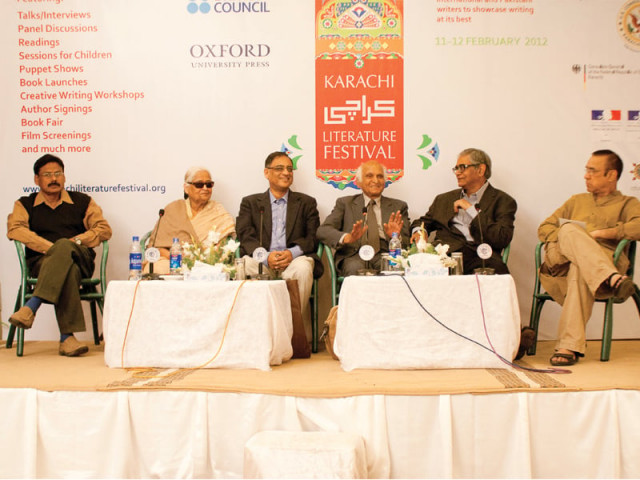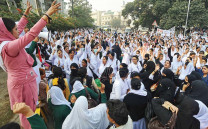Writers and poets offer modern solutions to navigating ‘tough’ Urdu classics
Not many people can even read the Urdu literature properly, let alone comprehend it, says Iftikhar Arif.

Poet Zehra Nigah, author Intizar Hussain, poet Iftikhar Arif, Indian fiction writer Khalid Jawed and scholar Prof. Dr Nomanul Haq talked about different aspects of Urdu fiction. But unfortunately the hall was half empty. The speakers were right when they said that not many people these days appreciated Urdu and understood it.
Zehra Nigah stressed that to appreciate classics one must respect the language. To substantiate her point, she recited selected couplets of Mirza Muhammad Rafi Sauda. She explained the simple intricacies of Sauda’s words to the audience who were paying rapt attention to her. The classical poets never missed an opportunity to ridicule the mullahs, qazis and sheikhs and their obscurantism. “But none of them was ever tried or chastised,” she said, referring to the increasing intolerance in society.
Asif Farrukhi, the moderator, led the discussion towards the influence of English literature on Urdu fiction as he referred to the works of Deputy Nazir Ahmed, Ratan Nath Sarshar and Abdul Halim Sharar.
Intizar Hussain called Sharar’s novel Firdous-e-Bareen an outstanding contribution to literature. “Read it while keeping in mind the on-going wave of terrorism and you will see how relevant the novel is today.” But on the other hand, he also criticised him for being the ‘pioneer’ of Islamic historical novels.
He praised Deputy Nazir Ahmad as a novelist but thought that his reformatory approach belittled his own work. He specially referred to the character of Nasuh in Taubat-un-Nasuh, a novel and said that it was even better than Bazarov in the famous Russian novel Fathers and Sons by Ivan Turgenev.
Known for his nostalgic themes and plots set against the background of Partition in 1947, Hussain was also critical of Islamic settings in Urdu daastans (tales). “I don’t limit myself to Arab or Ajam (non-Arab),” he said. “I go to the extent of relating myself to Mahabharta.”
The author highlighted another dimension of Urdu classics. “Our writers confine themselves within the tradition they adopted from the Arabs and Ajams,” he said. “But there is another distinctive colour in story writing which has been neglected... The ancient Indian tradition.”
If the Arab and Ajam fables, like Kalila o Damna, had been accepted in the literary tradition why weren’t the ancient Indian traditions accepted, even though they were geographically nearer to us than that of the Persian or Arab traditions? In Hussain’s opinion, we cannot draw boundaries in story-telling. “Whether it is Panchatantra or Mahabharat, wherever the roots trace back, it is our tradition.”
On the other hand, Iftikhar Arif thought that the word classic was quite misleading. He referred to contemporary literature being published under the label of ‘modern classics,’ which he said was sheer marketing by the publishing industry. “It is a vulgarisation of the classics,” he said.
He was also critical of the contemporary critics who, he said, “cannot recite a verse properly.” They are so ignorant that they mix craft with technique.
Arif said that in order to revive the classical tradition, the young generation needs to learn to read contemporary Urdu works. “Today’s writer is also responsible for producing original work,” he said. “Only this will enable our youngsters to read and understand the classics.”
He went as far as to say that a large number of people will not be able to even read what Intizar Hussein wrote, let alone comprehend it.
Indian fiction writer Khalid Jawed said that Ghalib had become a status symbol in India and was quoted by Hindi writers more than their Urdu contemporaries. “Classic literature is like modern-day malls,” he said. “You can window-shop, or you can also buy what you like. It has everything.”
Scholar Nomanul Haq said that the key problem was that society was disconnected from its past because of colonialism. He aptly defined what classified as a ‘classic’ work of literature. “The works which cannot be erased from the collective memory of society and provide the basis for civilisation come to be known as classics,” he said. “Without them it would not be possible to reclaim our cultural traditions.”
Published in The Express Tribune, February 13th, 2012.


















COMMENTS
Comments are moderated and generally will be posted if they are on-topic and not abusive.
For more information, please see our Comments FAQ